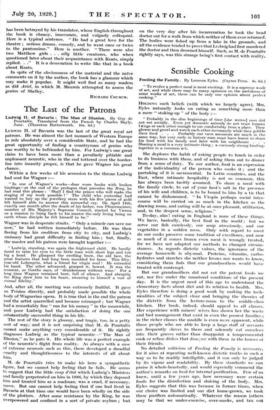The Last of the Patrons
Ludwig II. of Bavaria : The Man of Illusion. By Guy de Pourtales. Translated from the French by Charles Bayly, Junr. (Thornton Butterworth. 10s. 6d.)
LUDWIG II. of Bavaria was the last of the great royal art patrons. He was almost the last monarch of Western Europe
to rule absolutely over a considerable State, and he had the great opportunity of finding a countryman of genius who was worthy to be befriended by him. For Ludwig's one great claim to have been more than a peculiarly pitiable and unpleasant neurotic, who in the end tottered over the border- line into insanity proper, is that he gave Wagner his great chance.
Within a few weeks of his accession to the throne Ludwig had sent for Wagner :-
" In one of Wagner's works—dear worn books with broken bindingsat the end of the prologue that precedes the Ring, he had read this phrase : ` Shall I find the prince who will make the staging of my work possible ? ' The child who yesterday had wanted to buy up the jewellery store with his five pieces of gold felt himself able to answer this sorrowful cry. On April 14th, exactly one month after the death of his father, von Pfistermeister, member of His Majesty's Supreme Council, started for Vienna on a mission to bring back to his master the only living being on earth whose disciple he felt himself to be."
Wagner was in desperate straits. " Only a miracle can save me now," he had written immediately before. He was then fleeing from his creditors from city to city, and Ludwig's emissary had great difficulty in finding him ; but, finally, the master and his patron were brought together :—
" Ludwig, standing, was again the frightened child. He hardly dared to raise his eyes to the little man with short legs and too big a head. He glimpsed the swelling brow, the old face, the great features that had long been moulded for fame. This fifty- year-old Lohengrin, what a friend for virgin soul ! He extended his hand. The other advanced, grasped it, bowed. It was the moment, as Goethe says, of ' drunkenness without wine.' For a long time Wagner remained bent, full of silence. And abruptly the King drew him to his heart, swearing to himself a vow of eternal fidelity."
And, after all, the meeting was extremely fruitful. It gave us Tristan directly, and probably made possible the whole body of Wagnerian opera. It is true that in the end the patron and the artist quarrelled and became estranged ; but Wagner had a remarkably fine " run for his money " in the meanwhile, and-poor ' Ludwig had the satisfaction of doing the one substantially successful thing in his life.
The rest of the story is gloomy, and tragic, too, in a petty sort of way;- and it is not surprising that M. de Pourtales cannot make anything very considerable of it. He rightly diagnoses Ludwig as the typical neurotic—" The Man of Illusion," as he puts it. His whole life was a perfect example of the neurotic's flight from reality. As always with a case of extreme neurosis such as this, there developed a dreadful cruelty and thoughtlessness to the interests of all about him.
M. de Pourtales tries to make his hero a sympathetic figure, but we cannot help feeling that he fails. He seems to suggest that the little coup d'etat which Ludwig's Ministers and family perpetrated on him in 1886, by which they deposed him and treated him as a madman, was a cruel, if necessary, move. But one cannot help feeling that if one had lived in Bavaria at that time one would have been wholly on the side of the plotters. After some resistance by the King, he was Overpowered and confined in a sort of private asylum ; but on the very day after his incarceration he took the head doctor out for a walk from which neither of them ever returned. The bodies were fished up from a lake in the grounds, and all the evidence tended to prove that Lu.iwig had first murdered the doctor and then drowned himself. Such, as M. de Pourtales rightly says, was this strange being's first contact with reality.
















































 Previous page
Previous page